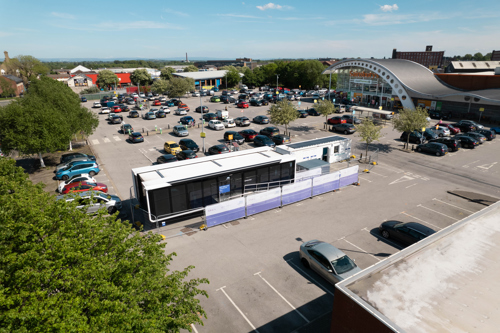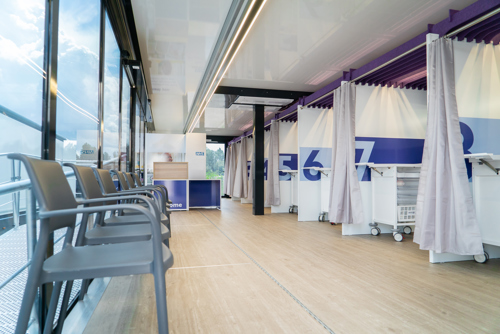World Vaccine Congress 2024: Collaborating for Greater Vaccine Equity
Dr Claire Sears, EMS Healthcare’s Head of Business Transformation, led a distinguished panel of experts at the World Vaccine Congress 2024 to discuss the pressing need for diversity, equity, and inclusion in vaccine research.
 Dr Claire Sears
Dr Claire Sears
Published 05 December 2024
 Clinical research
Clinical research
Held in the vibrant city of Barcelona, this year's World Vaccine Congress brought together global health leaders, researchers, and industry experts for four days of insightful discussions, networking, and collaboration.
Over 200 sessions covered a range of topics spanning immune profiling, clinical development, global health, supply, and access - providing a unique platform to address the sector’s most significant challenges.
The congress facilitated lively debate, offering attendees the opportunity to engage in conversations about overcoming shared challenges and advancing innovations that can drive more accessible, equitable, and effective vaccine solutions.
From the latest on mRNA advancements to tackling future pandemics, these discussions are essential as the world continues to push for health systems that work for all populations, particularly those most at risk.
Working Panel on Vaccine Equity
As part of the event, EMS Healthcare had the privilege of hosting a panel session entitled ‘Driving equity, diversity and inclusivity into vaccine research: a framework for delivering differently’, that explored how the industry can break down barriers in vaccine trials.
EMS Healthcare’s Dr Claire Sears, Head of Business Transformation, was joined by Nader Daoud, Associate Director of Clinical Trial Health Equity at Moderna; Prof. Saul Faust OBE, Professor of Paediatric Immunology & Infectious Diseases at the University of Southampton; Dr Talita Honorato-Rzeszewicz, Associate Grant Officer for Global Medical Grants and Partnerships at the Institute of Translational Equitable Medicine, Pfizer; and Dr Edouard Betsem, Medical Director for Infectious Diseases and Vaccines at Parexel International.
The panel highlighted how patient-centred and community initiatives can support diverse patient engagement, increase accessibility, and help overcome logistical challenges to ensure inclusive trial participation across multiple geographies - crucial steps in achieving equitable health outcomes.
Addressing the Complexities of Diversity and Equity
"In a pluralistic world, diversity, equity, and inclusion remain a highly challenging concern in vaccine trials.
“While dealing with regulatory challenges and constant tensions between speed and equity, we need to reinforce collaborations between sites, the industry, and CROs to eliminate disparities and equitably enrol across the entire spectrum of the intended populations, especially those at highest risk or disproportionately burdened by disease." Dr Edouard Betsem, Parexel International.
Prof. Saul Faust further highlighted the challenges posed by inflexible trial protocols:
"One of the frustrations many investigators face is that protocols often come to us as a finished article - designed by key opinion leaders in another country, leaving no room for changes.
“This creates a real problem. Unless you're engaging investigators in all the countries where you plan to work, discussing who you want in your trial and what the protocol needs to achieve, you risk designing a protocol that is bloated, overly complicated, and ultimately inaccessible for participants."
The experts advocated for using local epidemiology and census data to guide site selection and patient engagement strategies. This proactive, data-driven approach will help to ensure that clinical trials truly reflect the populations they aim to serve.
 Nader Doaud outlined the data-driven approach Moderna take to help sites understand the diversity of their population. He explained that this didn’t necessarily mean that trials would go more slowly:
Nader Doaud outlined the data-driven approach Moderna take to help sites understand the diversity of their population. He explained that this didn’t necessarily mean that trials would go more slowly:
“The reality is that once they're aware of who is in the area, who they need to reach, the sites are then empowered to support them. They're empowered to be able to take that into account as they try to deliver these trials as fast as possible. It is possible to both be equitable and keep pace, but only if you're intentional from the very start.”
The panellists discussed how equity and inclusion might look different depending on geographic location, with varying factors in different countries and communities - e.g., ethnicity, gender, age, disability, and socio-economic status. Different countries have different restrictions on demographic data collection, potentially resulting in the substantial challenge of no detailed, community-specific information.
When there is an absence of data, working with communities becomes even more important and highlights the value of building sustainable, in-country research ecosystems that reflect local diversity and contribute to lasting change.
Early Engagement is Key
The panel underscored that designing trials with diversity in mind requires early and meaningful engagement with investigators and community stakeholders to ensure protocols are both inclusive and practical. A proactive approach helps reduce barriers to participation and increases the likelihood of equitable trial outcomes.
One key takeaway was the importance of integrating insights gained from data on local demographics and community needs from the outset of trial design, rather than considering diversity as an afterthought.
Dr Claire Sears commented: “What really came across during the panel was the need to think about how the studies meet the diverse needs of the population, and that this must be embedded throughout the development of the product. It’s not something that can be done if we’re only thinking about it when the protocol is finalised and we’re three months away from first patient in.”
The Long-Term Value of Inclusive Research
Despite the growing recognition of the importance of equity, diversity, and inclusion (EDI) in research, the discussion highlighted that there remains a disconnect when it comes to funding for outreach efforts and the additional resources needed to ensure inclusion.
This points to a need for more education and internal advocacy, ensuring that considerations around equity are embedded within organisations - as Dr Talita Honorato-Rzeszewicz, Pfizer, explained:
"So, this is where the system barrier comes in. For investigators, there's often this common perception: these people don’t want to participate, they’re difficult, it’s too hard, too complicated to reach them, or they’re too far away - because research sites are often concentrated in centres of excellence. Then, from the system’s perspective, have you accounted for the costs in your protocol? Costs to train healthcare professionals, to place them in communities, and to build this bridge?"
While the thoughtful planning and inclusion of diverse populations may add an additional level of complexity, it ultimately accelerates the progress of clinical trials, and can also support the eventual adoption of a vaccine in the community. By fostering trust and participation, inclusive research practices can help to overcome historical disparities.
Dr Sears said: “Having regulatory support for different models - such as the use of mobile healthcare, different technologies, or community-based research - is critical, and we are starting to see that shift from the regulators.”
Addressing Inclusion for All Populations
Following an insightful question from an audience member related to inclusivity for those who are neurodivergent, the panel explored the responsibility of ensuring clinical trials are accessible to everyone, regardless of their circumstances. Historically, some populations have been excluded from research due to logistical challenges or preconceived biases about their ability to participate effectively in trials.
Nader Daoud, Moderna, shared an example: "During a trial, we encountered a participant who became unhoused, and the investigator claimed it was too difficult to keep them in the study. However, when we reviewed the data, there were no missed visits or any indication that their changed circumstance made participation more difficult. We went back to the investigator and said, ‘You can't discontinue this person - you have to keep them in the trial.’"
By ensuring all populations have access to potentially life-saving treatments, research not only becomes more robust but also aligns with the principles of equity.
The discussion also touched on the importance of scrutinising exclusion criteria to ensure they do not inadvertently create selection bias. Dr Honorato-Rzeszewicz explained: "We have to be careful that our exclusion criteria doesn’t become selection bias. We have to ask, why do we have these exclusion criteria? In many cases, it’s about the risk of serious adverse events. But as we move from phase 1 to phase 3 trials and gain more information, we can expand these criteria and allow more people to participate.
 “Sometimes, it's just common that we just have lots of the same exclusion criteria as standard. But we should reevaluate that and ask: ‘Why not have older people? Why not include people with obesity, if it’s not a risk in the trial?’ These are the questions we must ask to make trials more inclusive."
“Sometimes, it's just common that we just have lots of the same exclusion criteria as standard. But we should reevaluate that and ask: ‘Why not have older people? Why not include people with obesity, if it’s not a risk in the trial?’ These are the questions we must ask to make trials more inclusive."
Dr Claire Sears further noted: “To truly make trials inclusive, we need systems and resources in place to support participants facing barriers, whether logistical, social, or systemic. This is about more than data - it’s about ensuring everyone has the opportunity to benefit from advancements in healthcare.”
Drive Greater Inclusion in Vaccine Research
Ultimately, clinical trials must embed diversity and inclusion as foundational principles, with a commitment to long-term community engagement. This approach goes beyond short-term recruitment targets and ensures that the trials are designed to benefit everyone, particularly underrepresented and underserved groups.
We were delighted to have engaged with so many industry experts, partners and delegates during a very busy few days at the congress. For EMS Healthcare, there are always learnings to be gleaned, and we look forward to many rewarding follow-up conversations in the coming weeks and months.
If you missed our session at the World Vaccine Congress or would like to learn more about how EMS Healthcare can support your vaccine trial, contact: info@ems-healthcare.com.